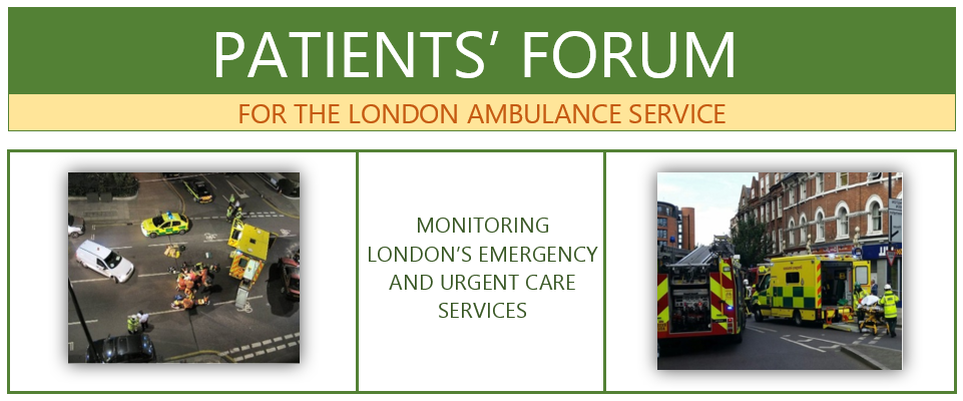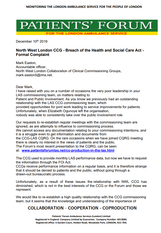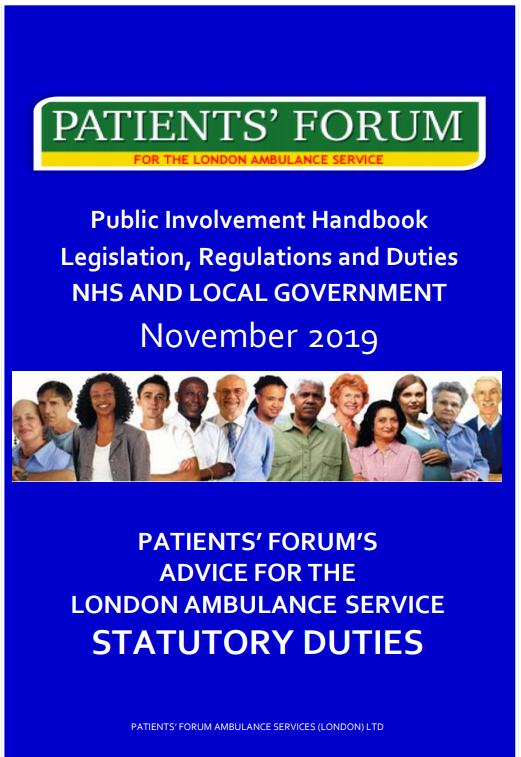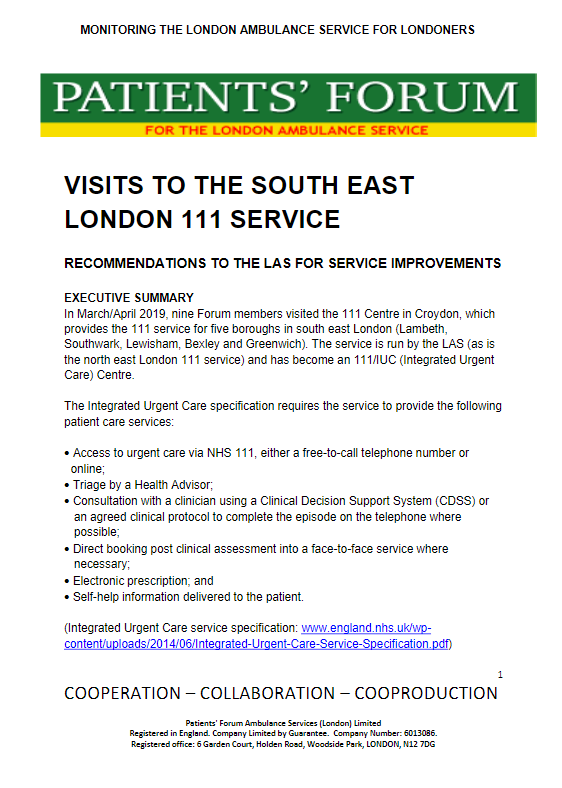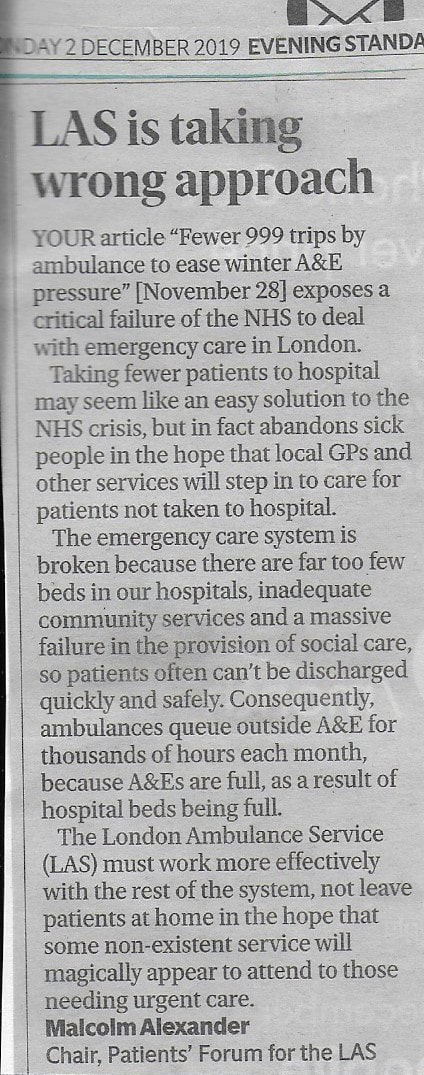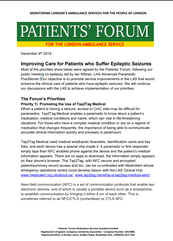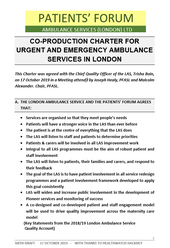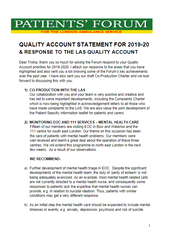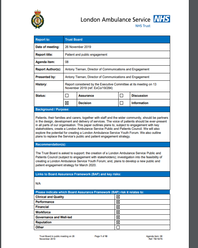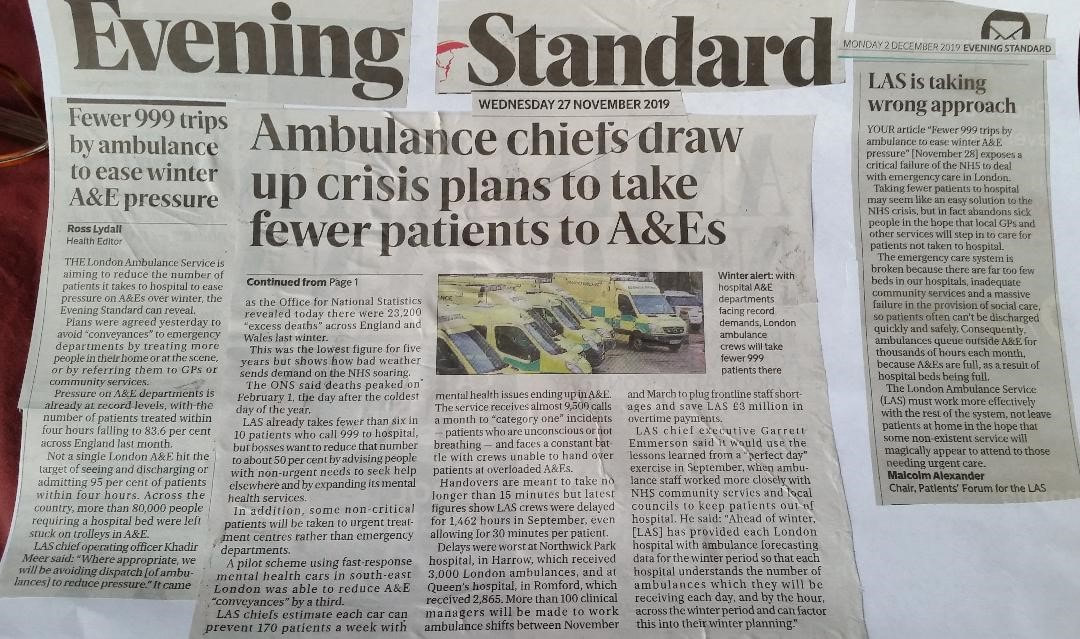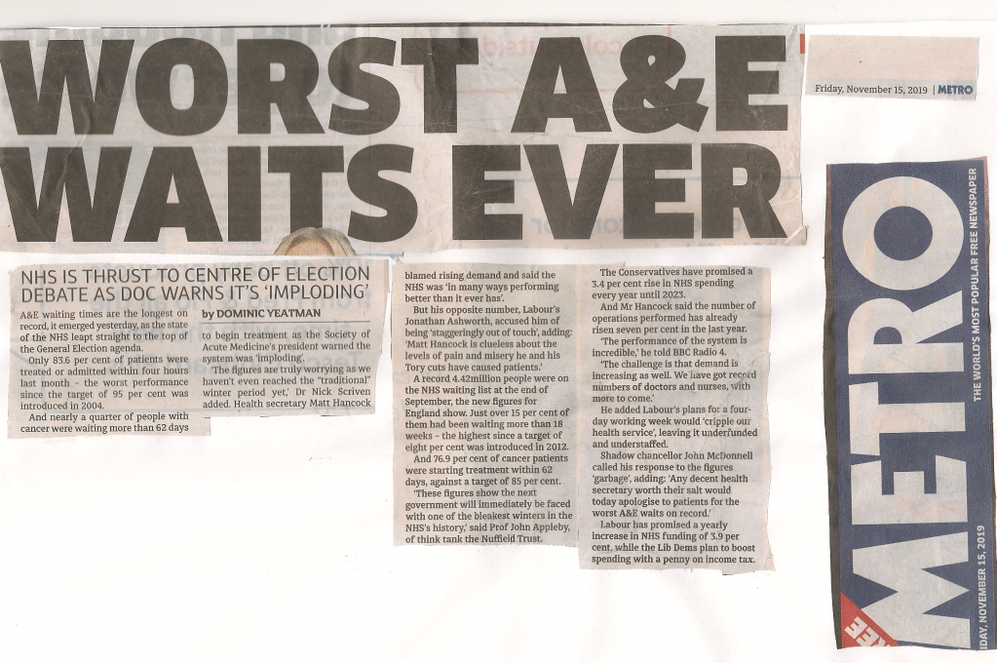ARCHIVE NEW ... NOVEMBER 2019 - DECEMBER 2019
FORMAL COMPLAINT TO THE INFORMATION COMMISSIONER REGARDING BREACHES OF THE FOI ACT BY THE LAS
Letters from Malcolm Alexander, Chair, Patients' Forum for the LAS
16 December, 2019
1. To Garrett Emmerson, Chief Executive, London Ambulance Service.
2. To Richard Cotton, Case Officer, Information Commissioner's Office.
Letters from Malcolm Alexander, Chair, Patients' Forum for the LAS
16 December, 2019
1. To Garrett Emmerson, Chief Executive, London Ambulance Service.
2. To Richard Cotton, Case Officer, Information Commissioner's Office.
|
PUBLIC INVOLVEMENT HANDBOOK - LEGISLATION, REGULATIONS AND DUTIES - NHS AND LOCAL GOVERNMENT - November 2019
20 pages NHS Constitution (2013) - Pledges and Promises - Duty to Involve Service Users - guidance on S242 of the NHS Act - What Level of Involvement and Engagement is Required? - Case Law on the Duty to Involve - Proposal for Significant Changes to the NHS Services? - Secretary of State's 4 Tests for Service Reconfiguration - Healthwatch - Providers + Commissioners must Engage - What Makes a Well Run Consultation - Ensuring Effective Public Involvement - Commissioners' Statutory Public Involvement Duties - CCGs Other Statutory Duties - Specialist and Primary Care Commissioning - NHS Must Consult Local Authorities on Major Service Changes - Public Sector Equality Duty - References - Appendix 1: Specific Duties arising from the H&SC Act - Appendix 2: rules for Effective, Lawful Consultation Process - The Forum's Mission Statement |
|
VISITS TO THE SOUTH EAST LONDON 111 SERVICE
Recommendations to the LAS for Service Improvements 6 pages Executive Summary - Forum Members who Participated in Monitoring the 111 Centre - Next Steps: Parity of Esteem for Patients in a Mental Health Crisis - Parity of Esteem and Mental Health Care in the LAS Clinical Hub - 111:999 Liaison - Access to the LAS Mental Health Car - Call Handler and Clinician Training - Communications with Patients Experiencing a Mental Health Crisis - Working with the Voluntary Sector - Severe Gynaecological Issues - Dental Care - Access to Falls Teams - Safeguarding Referrals - Care Plans and Co-ordinate My Care - Time Frame for Call-Backs - Access to GPs - Impact of Trauma on Call Handlers and Clinical Staff - Reporting and Learning from Incidents - Work Experience - Career Development for Call Handlers 111 Service Quality - Following Up Clinical Outcomes and Patient Centred Feedback - Feedback from the LAS Clinical Hub Caller's Clinical History - Access to Historical Calls - Reviewing Regular Callers - Secure Access to Key Information Sources |
|
LETTER TO EVENING STANDARD from Malcolm Alexander, Chair, Patients' Forum for the LAS Monday, 02 December 2019 LAS is taking wrong approach. Your article 'Fewer 999 trips by ambulance to ease winter A&E pressure' (November 28) exposes a critical failure of the NHS to deal with emergency care in London. Taking fewer patients to hospital may seem like an easy solution to the NHS crisis, but in fact abandons sick people in the hope that local GPs and other services will step in to care for patients not taken to hospital. The emergency care system is broken because there are far too few beds in our hospitals, inadequate community services and a massive failure in the provision of social care, so patients often can't be discharged quickly and safely. Consequently, ambulance queue outside A&E for hours each month, because A&E are full, as a result of hospital beds being full. The London Ambulance Service (LAS) must work more effectively with the rest of the system, not leave patients at home in the hope that some non-existent service will magically appear to attend to those needing urgent care. |
IMPROVING CARE FOR PATIENTS WHO SUFFER EPILEPTIC SEIZURES
Most of our priorities in this publication were developed following our Public Meeting on Epilepsy and led by Ian Wilmer, LAS Advanced Paramedic Practitioner.
Since that time, we have worked with the Epilepsy Society and the LAS, to improve the care of patients with Epilepsy. Sean and Vic Hamilton have provided outstanding leadership for the development of this work. Our objective is to promote service improvements in the LAS that would enhance the clinical care of patients who have Epileptic Seizures. We shall continue our discussions with the LAS to achieve implementation of our priorities.
The are also a number of service developments which have been considered over the past year, and we look forward to seeing the LAS's decision on the following issues:
1. Review of appropriateness of conveyances of people to A&E following an Epileptic Seizure.
2. Progress been made with regard to the care of patients with PNES? (Psychogenic Non-Epileptic Seizures)
3. Introduction of the national recommended dose of Rectal Diazepam.
4. Access to IM Midazolam for Paramedics, e.g for CSE. (Convulsive Status Epilepticus)
5. Recommendations for treatment of adults experiencing focal convulsions.
6. Introduction of second-line medications for APPs (Advance Paramedic Practitioners).
7. Publication of National Adult Convulsion Guidelines.
Please also find below, the Co-Production Charter with the LAS which Trisha Bain, Chief Quality Officer, has confirmed is supported by the LAS.
Most of our priorities in this publication were developed following our Public Meeting on Epilepsy and led by Ian Wilmer, LAS Advanced Paramedic Practitioner.
Since that time, we have worked with the Epilepsy Society and the LAS, to improve the care of patients with Epilepsy. Sean and Vic Hamilton have provided outstanding leadership for the development of this work. Our objective is to promote service improvements in the LAS that would enhance the clinical care of patients who have Epileptic Seizures. We shall continue our discussions with the LAS to achieve implementation of our priorities.
The are also a number of service developments which have been considered over the past year, and we look forward to seeing the LAS's decision on the following issues:
1. Review of appropriateness of conveyances of people to A&E following an Epileptic Seizure.
2. Progress been made with regard to the care of patients with PNES? (Psychogenic Non-Epileptic Seizures)
3. Introduction of the national recommended dose of Rectal Diazepam.
4. Access to IM Midazolam for Paramedics, e.g for CSE. (Convulsive Status Epilepticus)
5. Recommendations for treatment of adults experiencing focal convulsions.
6. Introduction of second-line medications for APPs (Advance Paramedic Practitioners).
7. Publication of National Adult Convulsion Guidelines.
Please also find below, the Co-Production Charter with the LAS which Trisha Bain, Chief Quality Officer, has confirmed is supported by the LAS.
|
2020-2021 LAS QUALITY ACCOUNT
The Patients' Forum has invited Trisha Bain, Chief Quality Officer, to speak at a meeting on Monday, 13 January 2020 at 6.00pm. She has been asked to speak about her plans for the 2020-2021 LAS Quality Account. This is a 'statutory' document, which the Forum contributes to, and which describes how the LAS plans to improve the quality of services to patients. The Forum's last 'statutory statement' to the Quality Account is shown in the attached Report. Trisha Bain will also report on progress with implementing the Forum's recommendations. The meeting will be held in the LAS Conference Room, and everyone is welcome to attend. |
|
PATIENT AND PUBLIC ENGAGEMENT - London Ambulance Service NHS Trust
Report by: Antony Tierman, Director of Communications and Engagement 26 November 2019 ... 9 pages This paper outlines plans, subject to engagement with key stakeholders, to create a London Ambulance Service Public and Patients' Council. |
